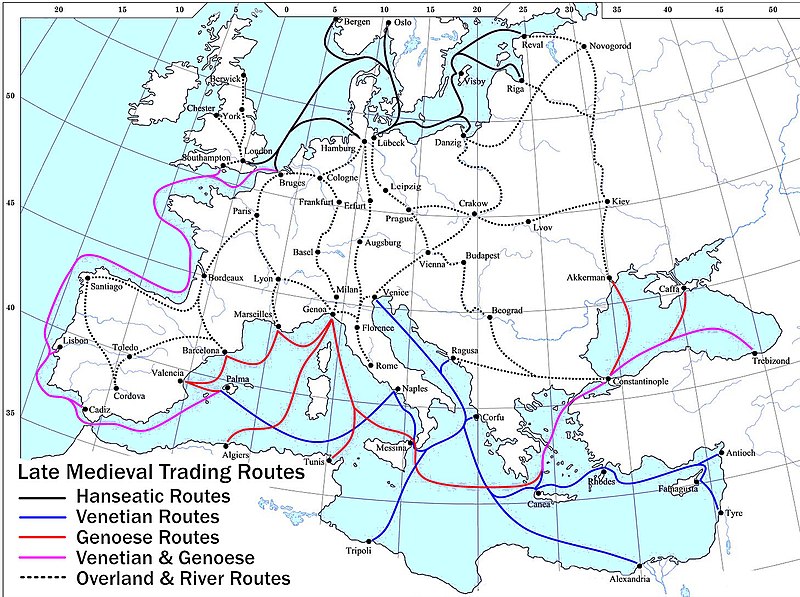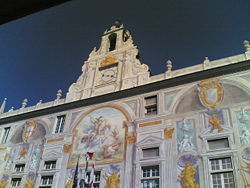There is a tendency to believe peer production to be a better system. Fine with that, the point now is whether it is sustainable or not.
As it was argued in the previous post there is at least ground for considering fundamental similarities between our understanding of P2P and the medieval Maghrebis traders´ system. However Maghribis traders succumbed to history meanwhile Genoese survived, created some of the first banks and shares and thereby established the foundational stones of capitalism.
If P2P system is superior/preferable why did it not succeed?
-------------------
Lets see first what where the fundamental similarities and differences between Genoeses and Maghribis.
"Genuensis ergo mercator" (Genoese, therefore merchant), says an old proverb. Effectively, large-scale long-distance overseas trade was central not only to Maghribis but to Genoa. Both the Maghribis and the Genoese began trading in the Mediterranean in the eleventh century and in similar conditions:
"The Maghribis and the Genoese faced a similar environment, employed comparable naval technology, and traded in similar goods." (Greif 1994, p.917)
They both faced a similar organizational problem: in order to organize overseas trade, agents are needed abroad to handle the merchandise, but without proper institutions to supervise them reliance in their honesty (asymmetric information) was problematic.
So far these are all similarities, where are the differences?
As it was previously argued the Maghribis were an ethnical/cultural group (coalition) conforming a net of equipotent members -peers- where cooperation of equals was granted. This coalition solved the organizational problem of overseas trade through a reputation-mechanism: free information flows from and through any peer enabling identification of cheating members which are punished with the exclusion of the net. Hence there was a stable system based on trust in which trust was enabled by access to information and exclusion of non-trustable members.
In contrast to this cooperative system with an open approach towards information as a communal good,
"(...) the Genoese seem to have held an opposite attitude regarding information sharing. Lopez (1943) noted the efforts of the Genoese to conceal information and conjectured that the `individualistic, taciturn, and reserved Genoese´ were not `talkative´ about their businesses and were even `jealous of their business secrets´ (p. 168)". (G.94, p. 924)
Maghribis behaved as a common-based peer production,
"(...) the networked environment makes possible a new modality of organizing production: radically decentralized, collaborative, and nonproprietary; based on sharing resources and outputs among widely distributed, loosely connected individuals who cooperate with each other without relying on either market signals or managerial commands." (Benkler 2006, p.60)
While for Genoese private property is at the core of their organizational system,
"The core characteristic of property as the institutional foundation of markets is that the allocation of power to decide how a resource will be used is systematically and drastically asymmetric. That asymmetry permits the existence of `an owner´". (B.06, p.61).
This divergence is also reflected on the predominant contractual forms in each group. While Genoese "(...) mainly used commenda contracts, which were, by and large, established between two parties one providing capital and the other providing work in the form of travelling and transacting overseas." Maghribis "(...) used mainly partnership and `formal friendship´. In a partnership, two or more traders invested capital and labor in a joint venture and shared the profit in proportion to their capital investment. In a formal friendship´, two traders who operated in different trade centers provided each other with agency services without receiving pecuniary compensation (Goitein 1967, p. 214 ff.; Stillman 1970; Gil 1983b, 1:200 ff.)." (G.94, p.928)
Different contractual forms shaped differently each society. Maghribis were a "homogeneous group of middle-class traders" (G.89, p.865), a horizontal net of equipotent peers being any peer both an agent and a merchant. "In contrast, agency relations among the Genoese traders were vertical. Wealthy merchants who rarely, if ever, functioned as agents hired relatively poor agents who rarely, if ever, functioned as merchants (De Roover 1965, p. 51 ff.). Byrne (1916, p. 159) concluded that during the late twelfth century, `as a rule´ the Genoese agents were `not men of great wealth or of high position.´" (G.94, p.928).
Genoese traders are not equipotent at all: either agent (low wealth and social status) either merchant (wealthy and high status), information does not flow (secrecy is predominant) and there is rather competition than cooperation. Genoese's organizational system is basically the opposite of Maghribis.
What is the underlying cause of this divergence? Greif (1994) points to cultural beliefs as the radical difference between both of the groups. But how can a "bunch" of beliefs account for such a divergent differentiation?
While the Maghribis had a collectivist tradition the Genoese were individualist:
"(...) Christianity during that period placed the individual rather than his social group at the center of its theology. It advanced the creation of `a new society based not on the family but on the individual, whose salvation, like his original loss of innocence, was personal and private´ (Hughes 1974, p. 61)." (G.94, p.923)
The eleventh century witnesses a spectacular rise in commerce, it is the preliminary stage of the commercial revolution. It is in this context that Genoa explosively develops as one of the main trading Mediterranean ports. This explosive economic growth attracted immigration. Information acquisition and transmission was costly in the middle ages and incentives and mechanisms are needed for information to be shared. As Benkler (2006, p.100) points out, "core inputs of information production ubiquitously distributed in society is a core enabling fact, but it alone cannot assure that social production will become economically significant."
This is in fact the case,
"If the (...) individual can satisfy his need through self-sufficiency, or through aid from some official source without incurring an obligation, he will do so-and thus fail to add to the social capital outstanding in the community." Coleman (1988, P.S117).
In this context of explosive commercial and economic growth with neither previous structures nor incentives for information sharing an individualist scheme triumphed over more communal alternatives.
"Instead of a few dozen traders who had previously been active in each trade center abroad, hundreds of Genoese began trading. At the same time, Genoa experienced a high level of immigration. For instance, Genoa's population increased from 30,000 to 100,000 between 1200 and 1300. In the absence of appropriate social networks for information transmission, the individualist equilibrium was likely to be selected. Once it was selected, individualist cultural beliefs discouraged investment in information. In the absence of a coordinating mechanism, a switch to a collectivist equilibrium was not likely to occur". (G.94, p.924).
In the other hand, Maghribis´ reputation mechanism was based on trust, information access and exclusion. In a context of explosive growth and overseas commercial expansion the conditions for trust and reputation mechanisms are difficult to be achieved. Different cultural beliefs (collectivist/individualistic), accelerated growth and trade expansion yielded the completely opposite solutions to the common organizational problem of overseas trade.
Trade expansion and transaction costs: the rise of Genoa and the decline of the Magharebis
"Commercially, both groups responded similarly and expanded their trade from Spain to Constantinople. From the perspective of societal organization, however, their responses differed. The Genoese responded in an `integrated´ manner, but the Maghribis responded in a `segregated´ manner. The Maghribis expanded their trade employing other Maghribis as agents." (G.94, p.930).
This difference -integrated/segregated- proved to be fundamental. In order for the Maghribis to maintain their organizational system trust was required. Trust was achieved by establishing commercial relations only within the net, while the Genoese could hire anyone as agent. Genoese were more able than Magherebis in expanding their commercial net.
"As trade with more remote trade centers became possible, a merchant could either hire an agent from his own economy who would sail or emigrate abroad, or hire an agent native to the other trade center. Such intereconomy agency relations are likely to be more efficient than intraeconomy agency relations since they enhance commercial flexibility, and a native agent does not need to immigrate and is likely to possess a better knowledge of local conditions." (G.94, p.931)
Maghribis system radically depended on trust and this one on exclusion. Segregation was the result, and segregation proved to be a constraint for their expansion: the costs of expanding their net would have outweighed the benefits. Benkler (2006, p.59) points out that "Industrial organization literature provides a prominent place for the transaction costs view of markets and firms". This is here the case: expanding Maghribis´ net reported excessive increases of transaction costs, so far that they could not expand the net. The opposite happened with the Genoese: since trust was not essential Genoese could capture the advantages of using native agents.
"(...) the primary reason to choose among proprietary and nonproprietary strategies, between marketbased systems—be they direct market exchange or firm-based hierarchical production—and social systems, are the comparative transaction costs of each, and the extent to which these transaction costs either outweigh the benefits of working through each system, or cause the system to distort the information it generates so as to systematically misallocate resources." (B.06, p.107).
The proprietary scheme of the Genoese was more able to expand than the communal approach of the Maghribis: Genoese had a comparative advantage in terms of transaction costs over the Magharibis.Maghribis could not overcome the intrinsic limitations that the architecture of their net imposed. When the net needed to be expanded the structure, the underlying architecture proved to be too rigid. The inability of the Maghribis to expand their net limited commercial expansion and prevented the survival of the model once trade was forbidden to the Maghribis.
"That this segregation is endogenous is reflected in the Maghribis' later history, when, toward the end of the twelfth century, they were forced by the ruler of Egypt to cease trading. At this point they integrated with the Jewish communities and vanished from the stage of history." (G.94, p.930)
Even though it can not be ascertained that the disappearance of the Maghribis´ system was due to intrinsic limitations it is however clear that they had strong intrinsic constraints and disadvantages in the context of trade expansion while the Genoese system did not.
Saint George Palace (Genoa)
How far can this be applied to "modern" P2P?
The underlying architecture of Maghribis´P2P organizational system had intrinsic disadvantages that prevented its expansion while proto-capitalism appeared, expanded and became the dominant system.
Will a similar story happen all over again? Is P2P architecture different?
------------
References
Greif, A.; "Reputation and Coalitions in Medieval Trade: Evidence o..." (1989)
Greif, A.; "Cultural Beliefs and the Organization of Society: A His... (1994)
Benkler, Y.; "The Wealth of Networks" (2006)
Coleman, J. S.; "Social Capital in the Creation of Human Capital". ...
*For a discussion on the right interpretation of the original sources see:
Edwards, J. and Ogilvie, S. “Contract Enforcement, Institutions and Social Capital: the Maghr.... (2008)
Contract Enforcement and Institutions among the Maghribi Traders: R...
Views: 265
Add a Comment
© 2024 Created by Josef Davies-Coates.
Powered by
![]()


You need to be a member of P2P Foundation to add comments!
Join P2P Foundation